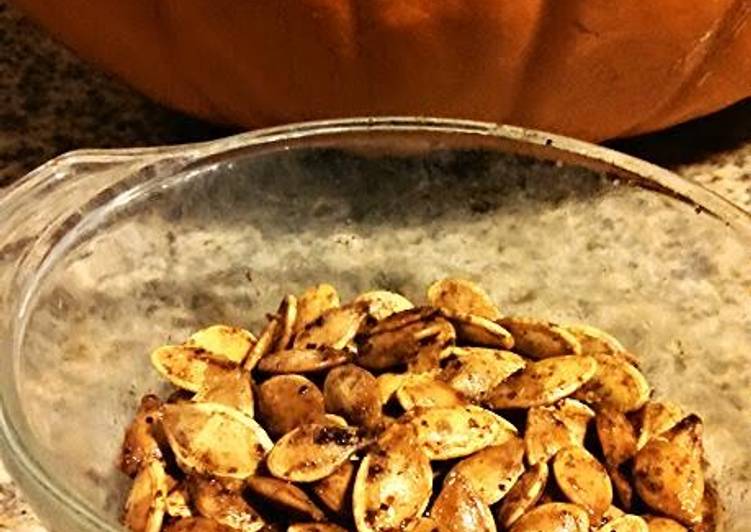Pumpkin seeds. A pumpkin seed, also known in North America as a pepita (from the Mexican Spanish: pepita de calabaza, "little seed of squash"), is the edible seed of a pumpkin or certain other cultivars of squash. The seeds are typically flat and asymmetrically oval, have a white outer husk. Pumpkin seeds may be small, but they're packed full of valuable nutrients.

Table of Contents
Ingredients of Pumpkin seeds
- You need 1 cup of fresh pumpkin seeds.
- Prepare 3 tbsp of brown butter.
- It’s 1/4 tsp of nutmeg.
- It’s 1/2 tsp of allspice.
- You need 1/2 tsp of ground cloves.
- It’s 1 tsp of cinnamon.
- Prepare tsp of onion powder.
- You need 1 tbsp of garlic powder.
- You need of sea salt.
- It’s of black pepper.
Pumpkin seeds (pepita) are edible kernels of fruit pumpkin. The seeds, indeed, are concentrated sources of many health-benefiting vitamins, minerals, antioxidants, and essential amino acids such as. Having a stable and adequate amount of protein in your diet is essential because proteins are made up of. Nutritional therapist Nicola Shubrook explains why pumpkin seeds are good for you.
Pumpkin seeds instructions
- Preheat oven at 300°. First clean the big chucks of pumpkin off you seeds in a strainer, don't worry about every string they add flavor when cooked..
- Melt the butter on low heat and keep there until slightly browned, it will add a nutty overtone to the seeds.
- Put seeds in a bowl and pour in the browned butter, add the cinnamon, nutmeg, cloves, allspice, onion powder, garlic powder, salt and pepper. Mix thoroughly..
- Spread on a sheet pan and place in oven for 45 minutes, every once in a while stir seeds to get a even browning..
- Once the seeds have a nice golden color on them they are good to eat. Enjoy.
She discusses their nutrient value, and the key benefits that make them so healthy. Pumpkin seeds are an item that can be used to grow pumpkin plants. The chance for seeds to drop increases with the stem's age. Pumpkin stems generate naturally in stem farm rooms in woodland mansions. Pumpkin seeds are nutritional powerhouses wrapped up in a very small package, with a wide variety of nutrients ranging from magnesium and manganese to copper, protein and zinc.